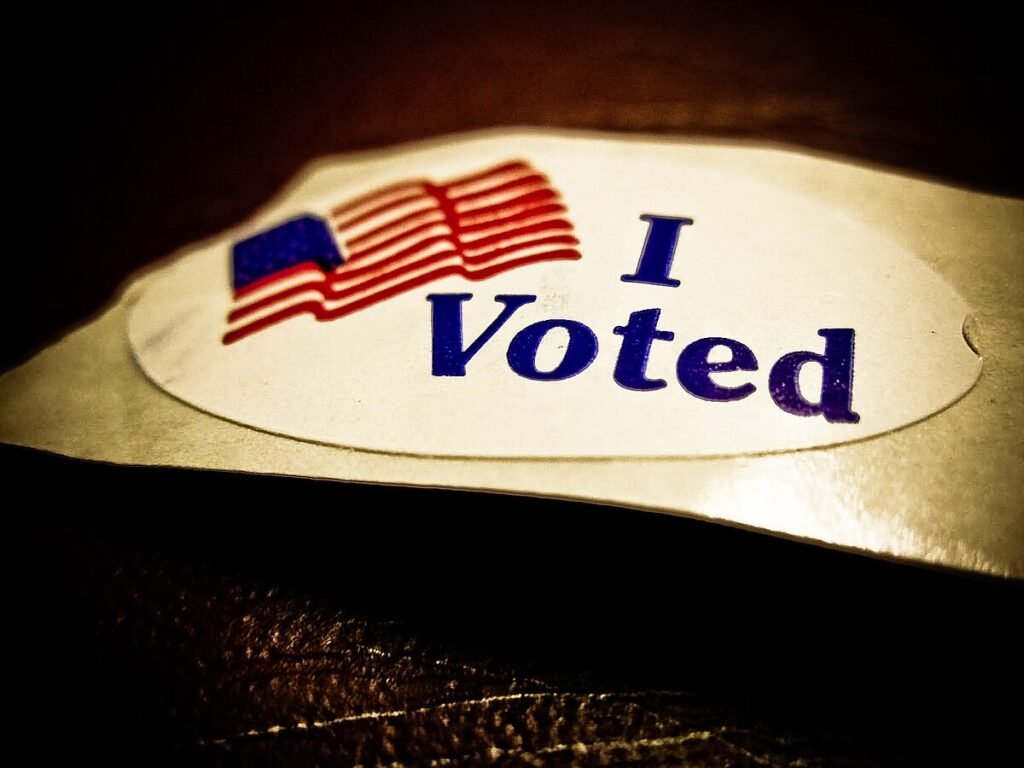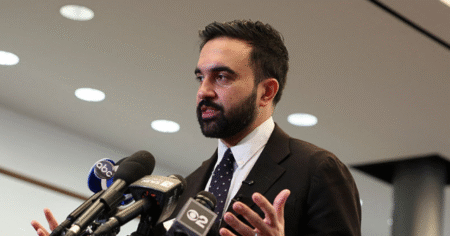November is right around the corner, which means several states and localities are gearing up for another round of old-fashioned American elections.
While not as expansive and numerous as midterm or presidential contests, this year’s Nov. 4 races are expected to be as important as the rest. From control of Virginia state government to a Democrat-led California redistricting initiative, here’s a breakdown of the biggest elections set to occur next month.
California
Not long after Texas Republicans announced plans to adopt a new congressional map that could net them up to five additional seats in the 2026 midterms, California Gov. Gavin Newsom moved to bypass his state’s redistricting commission and gerrymander the state even further in Democrats’ favor.
Despite Golden State voters rejecting efforts to repeal this commission in recent years, the Democrat-controlled legislature — with Newsom’s support — passed a new map that will appear as an initiative on California’s November ballot. Dubbed Proposition 50, the measure would adopt the legislature-approved map for 2026 through 2030 and seeks to offset the likely-Republican pickups resulting from Texas’ new map.
[READ: California’s Gerrymandering Scam Raises Election Integrity Concerns]
Democrat-led efforts to further gerrymander California have received significant financial support from leftist mega-donors like George Soros. In mid-September, The New York Times reported that the big left-wing spender dumped upwards of $10 million into Newsom’s bid to redraw the state’s congressional map, with Silicon Valley venture capitalist Michael Moritz and Netflix co-founder Reed Hastings also donating $2.5 million and $2 million to the effort, respectively.
Maine
In Maine, voters will have the opportunity to adopt voter ID in elections via a ballot initiative.
Titled, “Maine Question 1, Require Voter Photo ID and Change Absentee Ballot and Drop Box Rules Initiative,” the measure would require all eligible voters to provide an acceptable form of photo identification for voting in person and by mail. It also includes additional proposed changes to the state’s election laws, such as a limitation on the number of ballot drop boxes (one per locality) and a mandate that voters complete a written application to receive a mail ballot.
Requirements for individuals who help a voter request an absentee ballot and moving up the deadline to request an absentee ballot before an election are also included in the measure, as reported by The Federalist.
While the initiative is set to appear on the Pine Tree State’s November ballot, the description of what its passage would mean for voters is not in line with what its backers proposed.
As The Federalist previously reported, citizens affiliated with Voter ID for ME — the campaign that collected signatures for the measure to appear on the ballot — sued Secretary of State Shenna Bellows in May for allegedly using “misleading” language to describe the initiative. Bellows has previously expressed opposition to the measure and voter ID laws in general.
The Maine Supreme Judicial Court rejected plaintiffs’ challenge in July, allowing Bellows’ description to be used on the ballot for the general election.
New Jersey
Unlike most states, New Jersey conducts races for statewide executive offices (governor and lieutenant governor) and the state legislature in off-year elections. (Only seats for the General Assembly — not the state Senate — will be up this cycle.)
The race for governor will pit Democrat Mikie Sherrill against Republican Jack Ciattarelli, who put up a closer-than-expected challenge to Democrat Gov. Phil Murphy during the latter’s 2021 reelection bid. Meanwhile, the race for lieutenant governor will see Democrat Dale Caldwell face off against Republican James Gannon.
The gubernatorial race has been rocked by an alleged cheating scandal involving Sherrill during her time at the U.S. Naval Academy. As John Lucas recently noted in these pages, the Democrat candidate “still refuses to provide a full public accounting by stonewalling any release of USNA’s disciplinary records that would show the nature and extent of both her and her husband’s involvement in the cheating scandal.”
While still considered a reliably blue state, New Jersey has experienced an uptick in Republican voter registrations.
According to the New York Post, new data shows that the “number of registered Republicans in New Jersey grew by nearly 31,000 this year — while the number of registered Democrats dropped by more than 11,000.” Democrats, however, “still hold the overall edge in the Garden State, with a total of 2.5 million registered voters compared to about 1.6 million registered Republicans and 2.3 million unaffiliated voters,” according to the outlet.
[RELATED: NJ Governor Race Tests Effectiveness Of Post-2024 GOP Ground Game]
New York City
With Mayor Eric Adams no longer running for reelection, the race to lead New York City has come down to three main contenders: former New York Gov. Andrew Cuomo, state Assemblyman Zohran Mamdani, and Guardian Angels founder Curtis Sliwa.
While the race is largely seen as a contest between Democrats Cuomo and Mamdani, public polling has regularly indicted that Mamdani — an Islamic socialist — is on track to succeed Adams as NYC’s next mayor.
[READ: The Real Threat Isn’t Settler Colonialism — It’s Settler Immigration]
As Federalist Senior Contributor Nathanael Blake recently observed in these pages, Mamdani has not been shy about his hatred for Jews, embrace of jihadis, or support for defunding the police. The type of “sewer socialism” he touts, Blake additionally noted, “will hurt those whom Mamdani claims to want to help.”
“New York City is not going to get good government socialism from woke ideologues who despise the actual working class,” Blake wrote. “’Sewer Socialism’ is just a pipe dream.”
[RELATED: NYC Shows You Can’t Import The Third World Without Importing Its Failed Politics]
Pennsylvania
On the Keystone State’s November ballot will be retention elections for three Democrat justices on the Pennsylvania Supreme Court — Christine Donohue, Kevin Dougherty, and David Wecht.
According to Ballotpedia, “If voters do not retain a justice, [Democrat] Gov. Josh Shapiro … with approval from two-thirds of the Republican-controlled Pennsylvania Senate, can appoint a temporary replacement until 2027, when an election would be held for a permanent replacement.” Should voters choose not to retain all three justices “and the Senate does not approve Shapiro’s nominees,” the court — which currently has a 5-2 Democrat majority — “would be split with two liberals and two conservatives,” teeing up potential deadlocked votes on critical cases that come before the bench.
Any of the justices successfully retained by voters will serve another 10-year term on the court.
The retention elections are notable given the Pennsylvania Supreme Court‘s role in deciding pivotal matters involving the state’s elections.
Ahead of the 2024 election, for example, the Keystone State’s highest court issued a split decision authorizing voters who botched their mail-in ballots fill out another one. As The Federalist’s Breth Brelje previously summarized, the majority “granted voters who improperly cast a ‘naked’ mail-in ballot permission to cast a provisional ballot at their polling place” — in spite of state law indicating such a practice is not permitted.
The Pennsylvania Supreme Court also notably affirmed a lower court ruling that kicked left-wing presidential candidate Cornel West off the state’s 2024 ballot.
Texas
In addition to a series of municipal elections, Texas will have 17 statewide initiatives on its November ballot.
Among the most prominent is Proposition 15, which would amend the Texas Constitution to include a parental bill of rights. More specifically, the initiative would “affirm that a parent has the responsibility to nurture and protect the parent’s child and the corresponding fundamental right to exercise care, custody, and control of the parent’s child, including the right to make decisions concerning the child’s upbringing.”
Also set to appear on the ballot is Proposition 16, which would alter the state’s founding document by including a only-citizens voting amendment. The proposal would stipulate that “persons who are not citizens of the United States” may not vote in Texas elections.
Despite leftist claims to the contrary, several states — including Texas — have identified prospective noncitizens who are registered to vote and have cast ballots in U.S. elections. Earlier this week, for instance, Texas Secretary of State Jane Nelson revealed her office recently found more than 2,700 “potential noncitizens” on the state’s voter rolls.
Virginia
Much like New Jersey, Virginia conducts off-year elections for its key statewide offices and state legislature. This fall, races will be held for governor, lieutenant governor, attorney general, and the House of Delegates.
With the state’s constitution prohibiting Republican Gov. Glenn Youngkin from serving two consecutive terms, GOP Lt. Gov. Winsome Earle-Sears is running for the position against former Democrat Rep. Abigail Spanberger. In the race for lieutenant governor, Republican John Reid is facing off against Democrat Ghazala Hashmi, while GOP Attorney General Jason Miyares is running for reelection against Democrat Jay Jones.
While current state-federal political dynamics and Virginia’s status as a blue state initially indicated Democrats dominating the contests, recent developments have made the races tighter than anticipated.
Several weeks before Election Day, a series of unearthed text messages showed Jones fantasizing about assassinating the state’s former Republican House speaker and the death of his children. Prominent Democrats — including Spanberger and Hashmi — have refused to drop their support for Jones’ campaign, with some local parties and Democrat voters continuing to openly embrace the disgraced candidate.
[READ: How Many Of 300,000 Virginia Early Voters Want To Change Their Mind On Jay Jones But Can’t?]
A series of trans-related scandals in Virginia schools and public facilities has also continued to rock the gubernatorial race, with Spanberger repeatedly refusing to say whether she believes trans-identifying men should be allowed into girls’ locker rooms, sports, and other private spaces.
For more election news and updates, visit electionbriefing.com.
Read the full article here












